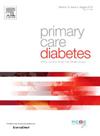Psychometric properties of the Slovenian versions of the diabetes empowerment scale, long and short form, among the slovenian adults with type 2 diabetes
IF 2.6
4区 医学
Q3 ENDOCRINOLOGY & METABOLISM
引用次数: 0
Abstract
Aims
To determine the psychometric properties of the Slovenian versions of the Diabetes Empowerment Scale (DES), both the long form (S-DES-LF) and the short form (S-DES-SF).
Methods
Between April and September 2023, we recruited adults with type 2 diabetes (T2D) using convenient sampling in five primary health centres. We examined internal consistency, test-retest reliability, criterion validity, and discriminant validity. Confirmatory factor analysis (CFA) evaluated the fit of the one-and three-factor models for S-DES-SF and S-DES-LF, respectively.
Results
The results of 288 individuals, with a mean age of 67 ± 9.2 years, including 132 men and 156 women, showed excellent internal consistency and strong test-retest reliability for both the S-DES-LF (Cronbach’s α=0.90; ICC=0.95) and S-DES-SF (α=0.91; ICC=0.92). Criterion validity of the S-DES-LF was confirmed through known-groups validity, with higher education (p=0.016) and absence of comorbid hypertension (p=0.034) associated with greater empowerment. Discriminant validity was demonstrated by the lack of significant correlations between the S-DES-LF and S-DES-SF scores with age or gender. CFA confirmed a good fit for the S-DES-SF's one-factor model but not for S-DES-LF three-factor model.
Conclusions
S-DES-LF and S-DES-SF are valid and reliable tools for assessing diabetes empowerment in Slovenian people with T2D. Future research should further explore the convergent validity of scales.
斯洛文尼亚成人 2 型糖尿病患者糖尿病赋权量表(长表和短表)的心理计量特性。
目的:确定斯洛文尼亚版糖尿病赋权量表(DES)长表(S-DES-LF)和短表(S-DES-SF)的心理测量特性:方法:2023 年 4 月至 9 月期间,我们在五个初级保健中心采用方便抽样的方式招募了 2 型糖尿病(T2D)成人患者。我们研究了内部一致性、重测可靠性、标准效度和判别效度。确认性因子分析(CFA)分别评估了S-DES-SF和S-DES-LF的单因子模型和三因子模型的拟合情况:结果显示,S-DES-LF(Cronbach's α=0.90;ICC=0.95)和 S-DES-SF(α=0.91;ICC=0.92)的内部一致性极佳,测试-再测信度也很高。S-DES-LF的标准有效性通过已知组的有效性得到了证实,教育程度较高(p=0.016)和无合并高血压(p=0.034)与增强能力相关。S-DES-LF和S-DES-SF得分与年龄或性别之间没有明显的相关性,这证明了区分有效性。CFA证实S-DES-SF的单因素模型拟合良好,但S-DES-LF的三因素模型拟合不佳:结论:S-DES-LF 和 S-DES-SF 是评估斯洛文尼亚 T2D 患者糖尿病能力的有效、可靠工具。未来的研究应进一步探讨量表的收敛效度。
本文章由计算机程序翻译,如有差异,请以英文原文为准。
求助全文
约1分钟内获得全文
求助全文
来源期刊

Primary Care Diabetes
ENDOCRINOLOGY & METABOLISM-PRIMARY HEALTH CARE
CiteScore
5.00
自引率
3.40%
发文量
134
审稿时长
47 days
期刊介绍:
The journal publishes original research articles and high quality reviews in the fields of clinical care, diabetes education, nutrition, health services, psychosocial research and epidemiology and other areas as far as is relevant for diabetology in a primary-care setting. The purpose of the journal is to encourage interdisciplinary research and discussion between all those who are involved in primary diabetes care on an international level. The Journal also publishes news and articles concerning the policies and activities of Primary Care Diabetes Europe and reflects the society''s aim of improving the care for people with diabetes mellitus within the primary-care setting.
 求助内容:
求助内容: 应助结果提醒方式:
应助结果提醒方式:


